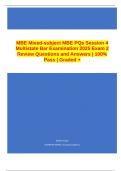MBE Mixed-subject MBE PQs Session 4
Multistate Bar Examination 2025 Exam 2
Review Questions and Answers | 100%
Pass | Graded +
David Mungai
[COMPANY NAME] [Company address]
,MBE Mixed-subject MBE PQs Session 4
Multistate Bar Examination 2025 Exam 2
Review Questions and Answers | 100%
Pass | Graded +
delegation liability - Answer>> When obligations are delegated,
the delegator is not released from liability, and recovery can be
had against the delegator if the delegate does not perform, unless
the other party to the contract agrees to release that party and
substitute a new one (a novation)
Larceny and Borrowing - Answer>> Larceny is the (i)
trespassory (ii) taking and carrying away - this element of the
crime, also known as asportation, requires only a slight movement
of the property.(iii) of the personal property of another (iv) with the
intent to permanently deprive that person of the property. If the
defendant intends only to borrow the property with the ability to do
so, then larceny does not occur because there is no intent to
permanently deprive the owner of the property
Moreover, if property is taken with the intent to return the property
and the property is accidently damaged or destroyed before it is
returned, larceny has not occurred.
Insurance Evidence - Answer>> Evidence that a person was or
was not insured against liability is not admissible to prove (or
disprove) negligence of wrongdoing.
Evidence that is both material and probative, or relevant, is
admissible only if it is not excluded by a specific rule. There is a
public policy exclusion for evidence that a person was or was not
insured, and thus such evidence is not admissible even though it
may be relevant.
,Entry with Arrest Warrant - Answer>> A warrant to arrest an
individual implicitly authorizes entry into the arrestee's home to
serve the warrant if the police have probable cause to believe that
the arrestee is present. In this case, the officer had a valid arrest
warrant and heard a woman's voice inside the house. This,
coupled with the man's statement that no woman was in the
house, is likely sufficient to establish probable cause. Therefore,
the officer's entry is likely constitutional.
The officer did not need the woman's consent to enter her house
because he possessed a valid warrant for her arrest.
For probable cause to exist, it is not necessary that the officer
personally observe the woman inside the house. The officer likely
had probable cause to believe that the woman was present in the
house based on hearing a woman's voice inside the house and
the man's statement that there was no woman in the house.
The facts do not indicate whether exigent circumstances existed
(e.g., the location of the child subject to the abuse), but the
existence of exigent circumstances is unnecessary because the
officer had a valid arrest warrant, implicitly authorizing entry into
the woman's house.
Duty to Strangers - Answer>> Victor would not have a valid
claim against Dorothy for negligence because Dorothy did not
owe any duty to Victor. A person does not have a duty to aid a
stranger unless a special relationship exists. Here, Dorothy found
Victor lying in the middle of the grocery store parking lot. Dorothy
had no special relationship with Victor and had never even seen
him before. Accordingly, she owed him no duty and cannot be
liable to him for negligence.
A farmer owned a 100-acre farm. Six months before his death,
the farmer ceased farming the land, but continued to live in his
, residence on the land with his friend and maintain the two acres
of his property that surrounded the residence. After the farmer
died, the farmer's friend continued to live in the residence and
maintain the two acres. The friend believed that she was the
owner of the farm pursuant to the terms of the farmer's will,
prepared shortly before his death, which specifically devised the
farm to her. Unbeknownst to the farmer's friend, the farmer,
several years before his death, had deeded ownership of the farm
to his son, which the son did not record. The son became
estranged from his father shortly thereafter and did not learn of
his father's death for 11 years. Recently, the son brought an
ejectment action against the farmer's friend.The statute of
limitations for adverse possession in the applicab - Answer>>
Under the doctrine of adverse possession, ownership of real
property is transferred to a person who exercises open, notorious,
hostile, and exclusive physical possession of that property for a
certain amount of time. If a person enters property under color of
title (a facially valid will or deed) and actually possesses only a
portion of the property, then constructive adverse possession can
give title to the whole. Here, several years before his death, the
farmer transferred ownership of the farm to his son.
Consequently, the farmer's provision in his will that devised the
farm to the farmer's friend was not effective. However, for 11
years after the farmer's death, the farmer's friend occupied the
residence on the farm and maintained the two acres surrounding
it. Because the applicable jurisdiction has a 10-year statute of
limitations, the farmer's friend has adversely possessed the
residence and the two acres surrounding it. Although the friend
did not actually possess the remaining 98 acres of the farm, the
friend likely constructively adversely possessed the 98 acres
through color of title as the friend erroneously thought that she
owned the entire farm based on the farmer's will. Answer choice
A is incorrect. The son's failure to record the deed to the farm
does not void his father's transfer of the farm to him. Moreover,
although the farmer's friend did not have notice of the earlier




